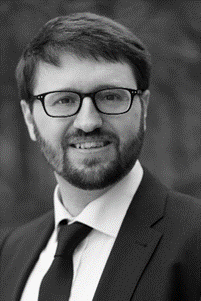Hybrid Magnonics
Magnons are the fundamental spin excitations of magnetically ordered materials, such as ferromagnets and antiferromagnets. Magnons combine non-linear properties with tunability and sub-micrometer wavelengths in the gigahertz-frequency regime. The field of magnonics [1] explores potential applications of magnons for information processing and communication. These applications encompass wave-based Boolean logic, neural networks, quantum technologies and miniaturized microwave components. The excitation, control, and detection of magnons is at the heart of this broad application spectrum.
In “hybrid magnonic” approaches, one goes beyond the well-established use of external magnetic fields to interact with spin excitations. Interfacing magnons with electrons, phonons & photons in hybrid architectures addresses a major challenge in the field of magnonics by providing pathways for more efficient excitation, control, and detection of magnons. I will discuss some of our results to exemplify unique features and merits of hybrid magnonics based on spin-spin interactions [2], spin-photon interactions [3], and spin-phonon interactions [4-6].
[1] Chumak et al., IEEE Trans. Magn. 58, 0800172 (2022)
[2] Al-Hamdo et al., Phys. Rev. Lett. 131, 046701 (2023)
[3] Liensberger et al., Phys. Rev. B 104, L100415 (2021)
[4] Küß, Albrecht, and Weiler, Front. Phys. 10, 981257 (2022)
[5] Shah et al., Adv. Electron. Mater. 2300524 (2023)
[6] Koujok et al., Appl. Phys. Lett. 123, 132403 (2023)
Date and Time
Location
Hosts
Registration
-
 Add Event to Calendar
Add Event to Calendar
Loading virtual attendance info...
- 1420 Austin Bluffs Pkwy
- Colorado Springs, Colorado
- United States 80918
- Building: Osborne Center for Science and Engineering
- Room Number: A204
- Contact Event Host
- Co-sponsored by UCCS
Speakers
 Mathias Weiler of RPTU Kaiserslautern-Landau
Mathias Weiler of RPTU Kaiserslautern-Landau
Hybrid magnonics
Magnons are the fundamental spin excitations of magnetically ordered materials, such as ferromagnets and antiferromagnets. Magnons combine non-linear properties with tunability and sub-micrometer wavelengths in the gigahertz-frequency regime. The field of magnonics [1] explores potential applications of magnons for information processing and communication. These applications encompass wave-based Boolean logic, neural networks, quantum technologies and miniaturized microwave components. The excitation, control, and detection of magnons is at the heart of this broad application spectrum.
In “hybrid magnonic” approaches, one goes beyond the well-established use of external magnetic fields to interact with spin excitations. Interfacing magnons with electrons, phonons & photons in hybrid architectures addresses a major challenge in the field of magnonics by providing pathways for more efficient excitation, control, and detection of magnons. I will discuss some of our results to exemplify unique features and merits of hybrid magnonics based on spin-spin interactions [2], spin-photon interactions [3], and spin-phonon interactions [4-6].
[1] Chumak et al., IEEE Trans. Magn. 58, 0800172 (2022)
[2] Al-Hamdo et al., Phys. Rev. Lett. 131, 046701 (2023)
[3] Liensberger et al., Phys. Rev. B 104, L100415 (2021)
[4] Küß, Albrecht, and Weiler, Front. Phys. 10, 981257 (2022)
[5] Shah et al., Adv. Electron. Mater. 2300524 (2023)
[6] Koujok et al., Appl. Phys. Lett. 123, 132403 (2023)
Biography:
Mathias Weiler obtained his Ph. D. degree from TU Munich, Germany in 2012. From 2012 to 2014, he was a postdoctoral fellow at the National Institute of Standards and Technology, Boulder, Colorado. From 2014 to 2020, he was a staff researcher at the Walther-Meissner-Institut, Garching, Germany. Since 2020 he has been full professor in experimental solid-state physics at the department of physics of the University of Kaiserslautern-Landau (RPTU), Germany. His research interests include magnetization dynamics and its control by photons, phonons, and electrons. In 2022, he was awarded a Consolidator Grant of the European Research Council. Mathias Weiler is deputy speaker of the magnetism division of the condensed matter section of the German physical society.
Email:
Address:Germany

